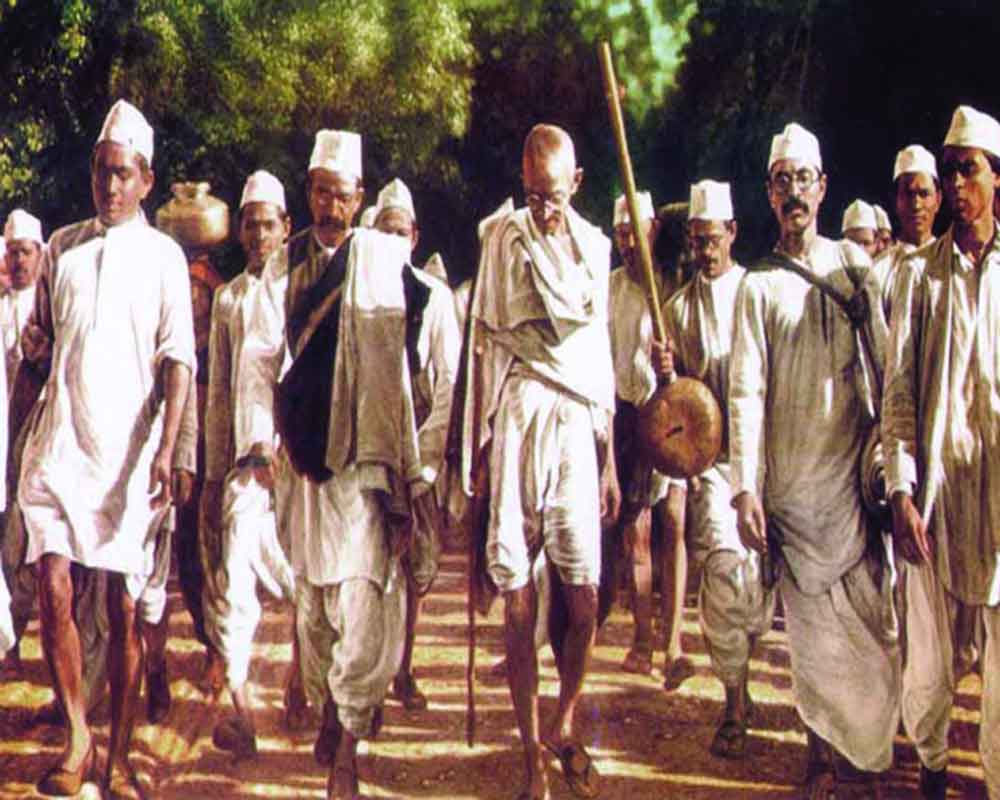The Dandi March serves as a reminder that peaceful protest can be a potent weapon against injustice and oppression
The 1980s film ‘Mard’ immortalised a poignant scene that encapsulates the essence of patriotism, rebellion, and sacrifice in Indian cinematic history. In this scene, the protagonist, amidst relentless flogging by the heroine armed with chains, whispers with unyielding spirit, “For this salt, our Mahatma led a revolution.” This homage vividly captures the spirit of the Salt Satyagraha of 1930, a pivotal moment in India’s quest for independence, led by Mahatma Gandhi.
The Salt Satyagraha, which took place from March 12 to April 6, 1930, galvanised a nation against British colonial rule. Gandhi’s symbolic act of picking up salt at Dandi defiantly challenged the salt taxes imposed by the British, symbolising defiance and resilience in India’s freedom struggle. Over 90,000 brave souls willingly embraced brutality in their pledge for nonviolence, standing as a beacon of hope against tyranny.
The genesis of the Dandi March was rooted in the momentum established by the Bardoli Satyagraha in 1928, led by Sardar Vallabhbhai Patel. This successful movement unified farmers and nationalists against oppressive British taxation, revitalising the spirit of the freedom struggle. By 1930, the Indian National Congress boldly articulated its aspiration for independence, setting the stage for Gandhi’s Salt Satyagraha.
Gandhi’s letter to Lord Irwin, the Viceroy, articulated the grievances of millions and announced his intention to lead a nonviolent protest against British atrocities. Despite Gandhi’s emphasis on dialogue and peaceful resolution, the Viceroy’s inadequate response led to the commencement of the Dandi March on March 12, 1930.
Accompanied by 78 dedicated followers, Gandhi embarked on a significant march covering nearly 241 miles from Sabarmati Ashram to Dandi. This symbolic journey aimed at challenging the oppressive salt tax and British monopolistic control over salt production. The disciplined resolve of the satyagrahis exemplified unity amidst diversity, embodying the nation’s aspirations for liberation.
On April 6, 1930, Gandhi’s defiance of the Salt Laws at Dandi marked a pivotal moment in India’s struggle for independence. His call to civil disobedience catalysed a mass boycott of British goods, prompting a harsh crackdown from British authorities. Despite brutal repression, the spirit of nonviolent resistance persisted, revealing the resilience of the Indian populace.
The Salt Satyagraha showcased resolute collective action, with over 60,000 willingly imprisoned and thousands more participating in peaceful protests. Despite Government reprisals, the ‘satyagrahis’ maintained remarkable restraint and nonviolent discipline. This nonviolent resistance ultimately led to negotiations with Congress leadership and Gandhi’s release after a year of imprisonment.
The Dandi March culminated in the historic breaking of the salt laws, a symbolic act of defiance that reverberated globally. Leaders like Martin Luther King Jr. drew inspiration from Gandhi’s example, recognising the power of nonviolent resistance in confronting injustice.
The Dandi March was not just a chapter in history but a transformative moment in India’s fight for independence, marking Gandhi’s emergence as a spiritual force. Through unwavering dedication to love and nonviolence, Gandhi wielded a potent weapon against oppression, demonstrating the profound impact of spirituality in challenging times.
(The writer is Programme Executive, Gandhi Smriti and Darshan Samiti; views are personal)


























